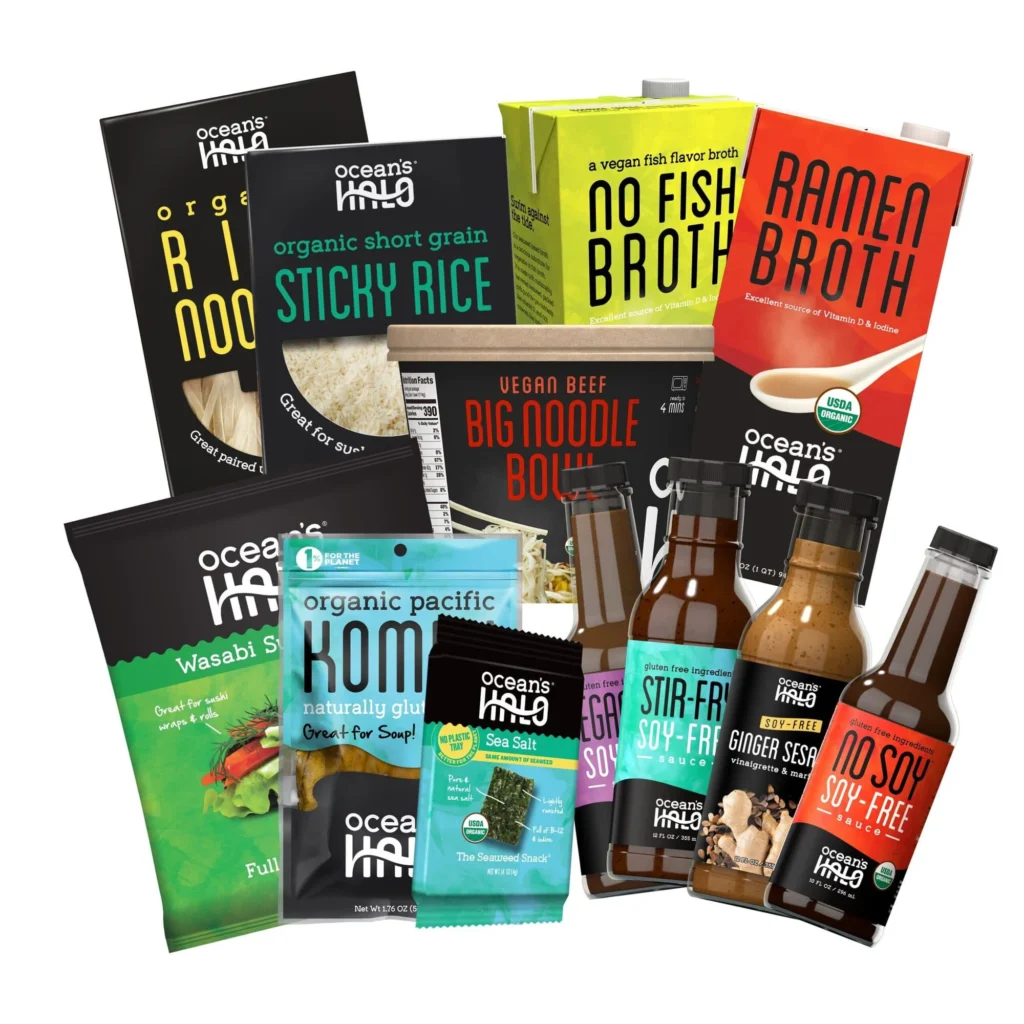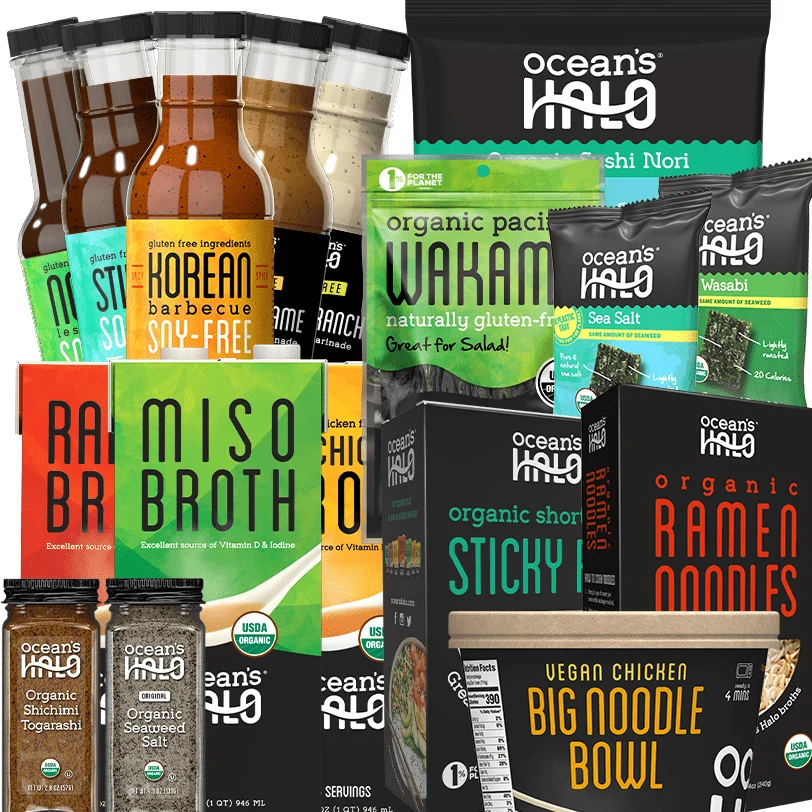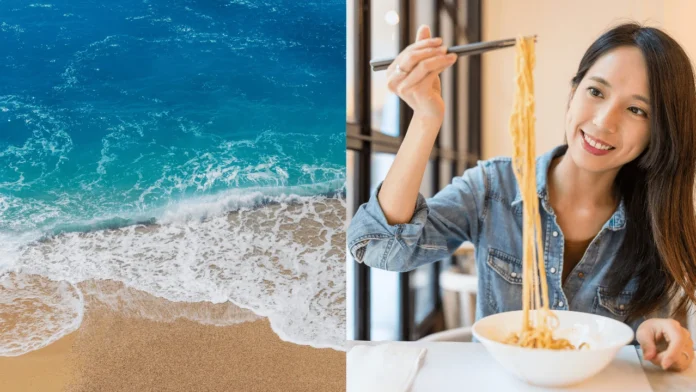Every year, almost 2 billion seaweed snacks are sold — and that means nearly 2 billion of those little plastic trays getting tossed into landfills. There, they become microplastics that enter the oceans, our food and water, and even our bodies. And those single-use plastic containers are everywhere: from ramen noodle bowls to rice wraps to the condiments we put on top of everything. But we don’t have to destroy the oceans to get delicious-tasting snacks and convenient meals. Ocean’s Halo offers delicious food and condiments that you can feel good about eating!
You May Also Like:
Don’t Destroy the Planet Just to Keep Clean: Cleancult Protects Your Family and the Earth
The cost of plastic-driven convenience
In our fast-paced, need-it-now world, quick, easy-to-make meals are essential. Demand for such offerings is higher than ever. Health-conscious consumers who also prioritize environmental responsibility often find themselves in a quandary. Nearly every healthy snack or quick, easy meal comes packaged in plastic. Whether bowl or tray – or even utensil – those plastics typically end up in a landfill, or worse, in a waterway. In the long run, they deteriorate into microplastics. Many of these creep into the ocean and even into the human food supply.
Healthy eating…with a side of plastic
Research shows that microplastics can be significantly damaging to marine ecosystems and to human health. A 2019 study in Environmental Science & Technology revealed that the average consumer may be ingesting as much as five grams of microplastic weekly. That’s like consuming a credit card’s weight in plastic every seven days!
Stepping up for greater sustainability
Fortunately, consumer awareness of plastic waste and its health and environmental dangers is increasing. Many people, in fact, are actively seeking products that generate less plastic. Businesses are taking note, with many stepping up to address consumer concerns and do the right thing.
Making a difference with ‘1’ small commitment
Nonprofits like 1% for the Planet offer a great example of organizations working to help clean up the ocean and reduce additional plastic waste. 1% for the Planet serves as a bridge between environmental organizations and for-profit companies. Participating companies “commit to donating at least 1% of annual sales directly to environmental organizations.”
Enter Ocean’s Halo, an innovative food company that proudly collaborates with 1% for the Planet. Ocean’s Halo’s commitment to reducing and cleaning up plastic waste runs far deeper, though. This conscientious brand has established itself as a leader among companies working to reduce their plastic footprint.
For the health of consumer and planet
Ocean’s Halo products satisfy not only taste buds but also encourage and contribute to healthier lifestyles. Its product line includes:
Seaweed snacks: The company launched in 2011 as a snack brand with a twist: it was committed to offering healthy alternatives to typical snack foods, which tend to be fried, greasy, and generally unhealthy. Seaweed proved a terrific option for a satisfying yet healthy alternative. The company’s line of delicious seaweed chips remains its flagship product.
Broths: Ocean’s Halo’s delicious, kelp-based broths blend nourishment, great taste, and responsible packaging. From Vietnamese pho to No Chicken, No Beef, Ramen, Miso, Tortilla Soup, and Thai Coconut varieties, these products provide a solid foundation for health-conscious cooking.
Noodles and rice: The company brings the same sustainable, health-focused mindset to its offerings in this category. Those offerings include sticky and purple rice, spring roll wraps, pho and purple rice noodles, and more.
Condiments: Ocean’s Halo’s line of condiments delivers a flavor-enhancing touch to any health-conscious recipe. The company markets this kelp-based line of sauces, dressings, and seasonings as antioxidant- and mineral-rich, vegan, and gluten- and soy-free.

Packaged for Planet Earth
If you’ve ever eaten seaweed from other brands, you may notice something missing from a pouch of Ocean’s Halo seaweed. Great taste? Not in the slightest. Body-nourishing levels of iodine and vitamin B12? Nope – both are in there, with 60% of the FDA’s recommended daily allowance in every pouch.
Gluten? MSG? GMO ingredients? Preservatives? Wrong again – these never find their way into any Ocean’s Halo products, which are all 100% FDA-certified organic. But there’s still something else missing from every pouch – packaging.
Out with the plastic
Virtually every brand available comes with the seaweed itself contained inside a cumbersome tray made of…yeah, you guessed it: microplastic-making, land-fill-packing, ocean-chocking plastic. For several years, Ocean’s Halo used such plastic for its own products. A few years ago, though, the company took a hard look at its packaging, determined to make a change.
Now, when you open an Ocean’s Halo seaweed pouch, there’s no plastic tray lurking within. The company has overhauled its packaging to eschew plastics in favor of natural fibers, proving that high quality and great taste needn’t be sacrificed for sustainability. That approach is in stark contrast to many other products in the sector, which continue to rely on Styrofoam and plastic. Many of these materials require centuries to fully decompose. Others may never fully decompose. All can do significant damage to human and environmental health.

The efficiencies of less plastic
According to Ocean’s Halo Chief Marketing Officer and Co-officer of Sustainability Matthew Ryan, the reduction of plastic packaging impacts more than just Ocean’s Halo’s environmental footprint. “Our reduction in plastic has been a great business decision,” Ryan explains. “Less plastic makes our packaging less bulky, requiring less space on retail shelves. Our data shows that the new packaging requires up to 400% less space. That means retailers can stock more of our products at once. That, in turn, means less restocking and more room for other products.”
There’s another benefit to Ocean’s Halo’s plastic-trimming crusade: increased supply chain efficiencies. Ryan explains, “Our smaller packaging footprint also empowers us to be leaner and more efficient in transporting our products and managing the supply chain from warehouse to retailer. The packaging process itself is less complicated, requiring fewer steps to get our product ready for transport.”
Partnerships for the greater good
As mentioned, Ocean’s Halo takes great pride in its partnership with 1% for the Planet. Its 1% yearly donation goes to four highly worthwhile organizations:
Monterey Bay Aquarium Sea Otter Program: This nonprofit organization sits right along the ocean in Monterey, California. That’s a prime location for the aquarium to coordinate and manage its Sea Otter program. The program strives to repopulate this magnificent creature along California’s coastline, where it helps create and maintain resilient ecosystems.
City Surf Project: This San Francisco-based organization aims to create equity in access to the ocean. It introduces inner-city kids, who might otherwise not have access, to the wonders of the ocean. The goal is to foster a connection with the environment through surfing.
Whole Kids Foundation: This organization serves as the charitable arm of Whole Foods Market. It strives to educate kids across the country about nutrition and to empower them to eat healthier. Ocean’s Halo’s commitment to good health and its status as a Whole Foods retail partner make this charitable collaboration a natural fit.
Conscious Alliance: Because Ocean’s Halo also focuses intensely on reducing food waste, partnering with this Colorado-based nonprofit is another natural fit. Conscious Alliance helps Ocean’s Halo ensure that excess food products that might otherwise be wasted reach needy schools and food banks.
A consumer call to action
Consumers, it must be noted, have the power to influence change through purchasing decisions. By choosing products like Ocean’s Halo’s, people can enjoy delicious, healthy food that contributes to the greater good. Purchasing these products, in fact, empowers you to do better not only for your own health but also for the health of our oceans and the world we all inhabit.

For further research:
Monterey Bay Aquarium – A history of our Sea Otter program
Phys.Org – ‘Time bomb’?: Race to identify health effects of microplastics
Food Navigator Europe – Finding microplastics with AI: A boon for the food industry?
Important Note: The information contained in this article is for general informational purposes only, and should not be construed as health or medical advice, nor is it intended to diagnose, prevent, treat, or cure any disease or health condition. Before embarking on any diet, fitness regimen, or program of nutritional supplementation, it is advisable to consult your healthcare professional in order to determine its safety and probable efficacy in terms of your individual state of health.
Regarding Nutritional Supplements Or Other Non-Prescription Health Products: If any nutritional supplements or other non-prescription health products are mentioned in the foregoing article, any claims or statements made about them have not been evaluated by the U.S. Food and Drug Administration, and such nutritional supplements or other


